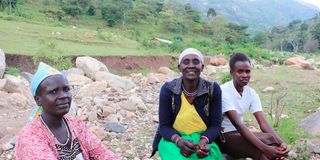West Pokot farmers learning survival tricks in landslide-prone areas

Chepkepumo Nadareng’, Julia Samson and Julianah Cheboi relax on rocks that replaced an arable land along Kapkaremba River - Kapkaremba Village in West Pokot County following a landslide that happened in 2019.
What you need to know:
- The rain-triggered landslide led to an overnight loss of livelihoods for residents in the semi-arid county who were using the land for irrigated food production.
- And now they have been forced into a new normal following the loss of thousands of acres of land that has since become a rocky field.
When thousands of rocks and boulders plucked themselves from Sikot hills and settled on swathes of land in Kapkaremba, West Pokot County, it did not make the news. Perhaps because no life was lost. But for the locals whose land lay buried under rocks along the Kipkomo River, their lives were crushed.
The rain-triggered landslide led to an overnight loss of livelihoods for residents in the semi-arid county who were using the land for irrigated food production. And now they have been forced into a new normal following the loss of thousands of acres of land that has since become a rocky field.
“I had a two-acre piece of land along the river, where I would toil with my wife to produce vegetables, maize and pulses that eventually fed our family, but now it is all under rocks and has totally been rendered useless,” said Musa Kedi, a resident.
The couple has now turned to livestock keeping as an alternative source of livelihood. “When we had our farm near the river, I did not see the need of suffering with livestock, which is highly susceptible to tough climatic conditions in this area,” said the father of five children.
However, following the introduction of a UN led project known as Women Economic Empowerment through Climate Smart Agriculture (WEE-CSA), the couple has learned different ways of adapting to the climate through activities such as raring drought-tolerant goat breeds, pasture farming and indigenous chicken raring.
“When this project came, we were put in groups of 30 people, most of them women, where we were trained and later asked to identify a business idea that could be supported,” said Kedi. As a result, the group known as Tondwo Women Group and consists of 24 women and six men, picked on keeping galla goats and pasture production.
“The weather in this area is sometimes extreme and unforgiving, especially during dry seasons, and that’s why we chose on galla goats, which we know are very resilient to such climatic conditions, as well as farming of drought tolerant pastures for the animals,” said Kedi. Most women were also trained on indigenous chicken keeping, which has become a constant income earner for them.
“With 17 chickens in my household, I get up to 12 eggs per day. This translates to at least two trays every week, which if I sell in the upper market at Sh15 per egg, I will secure at least Sh900 per week,” said Mary Limareng’ the chairlady of Tondwo Women’s Group.
“We are working directly with the county government of West Pokot on activities that can reduce the workload for women through agricultural production and productivity, thereby reducing food and nutrition insecurity,” said Brian Cherutich, a Gender and Climate Smart Agriculture expert at the Food and Agriculture Organisation (FAO). The FAO intervention is also in collaboration with the UN Women, Village Enterprise, and the County Government of West Pokot with support from the Korea International Cooperation Agency Kenya.
According to Isaac Ritakou, acting director for Planning and Budgets, West Pokot County, WEE-CSA model is a true testimony of livelihood transformation for the people of West Pokot. “Through these evidence-based testimonies, we have been able to draft a poverty graduation policy for this county,” he said.
Kedi said the trainings, right from selection of drought tolerant animal breeds, embracing poultry keeping as a source of livelihoods, and pasture production, have lifted his family from the poverty abyss.
“The project has so far given our group 16 galla goats as seed, but even before they start reproducing, we have been able to save and in the past two years, we have acquired six galla goats in our household through other sources of income,” said Kedi.
Apart from Kapkaremba, landslides have been a common phenomenon in West Pokot, a mountainous county with over 120 hills. During the same period when Kedi’s land was being converted into a rock field, it was reported that over 30 people, including children, were killed by landslides triggered by unusually heavy rains in Muino area near the Kenya-Uganda border.
Following the ongoing climate change negotiations at the global level, countries, particularly from the developing world, are seeking compensation for loss and damage for victims who have lost their property due to the impacts of climate change.
So far, a loss and damage finance fund has been approved to provide financial assistance to nations most vulnerable and impacted by the effects of climate change. However, according to experts, the success of this landmark achievement will depend on how quickly this fund gets off the ground.





